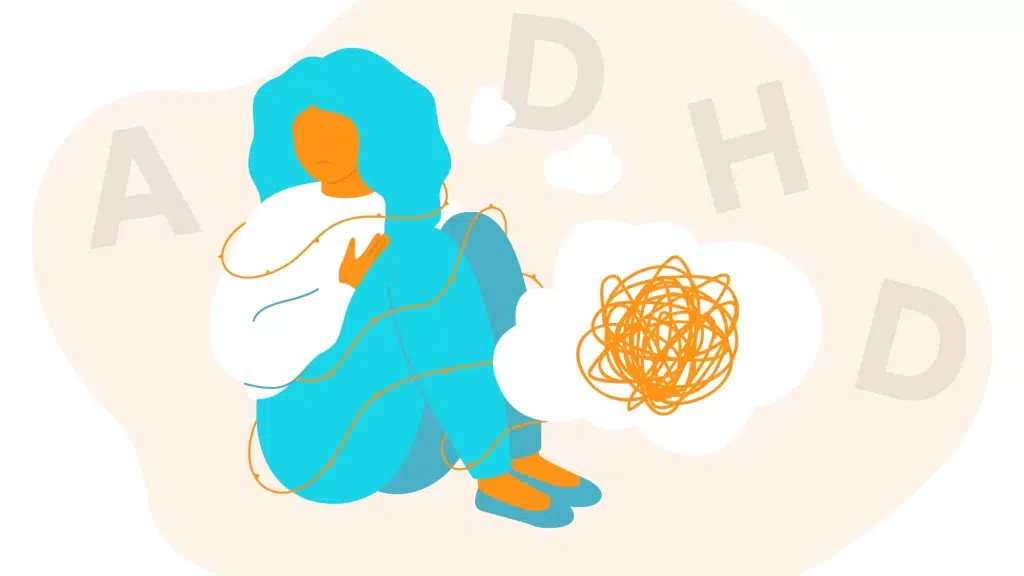A recent study published by the American Medical Association has suggested a possible connection between Attention-Deficit/Hyperactivity Disorder (ADHD), a neurodevelopment disorder, and dementia, a form of cognitive decline that affects memory, thinking, and behavior.
ADHD is typically associated with childhood, but its implications are known to extend well into adulthood, whilst dementia is mostly linked with the elderly, so the connection between the two is intriguing and worth exploring.
“The implications of a connection between ADHD and dementia are vast, and could affect diagnosis, treatment, and our understanding of both conditions.”

Definitions of ADHD and Dementia
What is ADHD?
ADHD is characterized by symptoms like inattention, hyperactivity, and impulsivity. While it’s most commonly diagnosed in children, many adults continue to experience its symptoms. It can impact various aspects of life, including work, relationships, and daily tasks.
What is Dementia?
Dementia isn’t so much a specific disease as a general term for a decline in cognitive ability. This decline can be severe enough to interfere with daily life. Alzheimer’s is the most common type of dementia. Symptoms include memory loss, difficulty in completing familiar tasks, and impaired judgment.
The study into connections between ADHD and dementia
109,218 individuals formed the study. Here are the findings:
730 had been exposed to ADHD. Interestingly, 13.2% of this group developed dementia — a stark contrast to the 7.0% in the non-ADHD exposed group.
The ADHD-exposed group, with a median age of 54.7 years in 2003, was slightly younger than the non-exposed group, which had a median age of 56.3 years. This group also had a higher percentage of males (59.7%) compared to females (40.3%).
When it came to health conditions, the ADHD-exposed group showed a higher prevalence of depression, obesity, hypertension, cerebrovascular disease, and diabetes compared to their counterparts.
A significant 22.3% of the ADHD-exposed group had been exposed to psychostimulants — a notable increase over the mere 1.1% in the non-exposed group.
What are the implications of this study?
These recent findings, which point towards a potential link between ADHD in adults and an increased risk of dementia, have stirred both intrigue and concern within the medical community and the general public.
The implications of such a connection are vast, and could affect diagnosis, treatment, and our understanding of both conditions.
Beyond Childhood ADHD: Traditionally, ADHD has been viewed primarily as a childhood disorder, with symptoms expected to wane as one transitions into adulthood. However, this study highlights the potential long-term cognitive implications of ADHD, suggesting that its effects might persist and predispose individuals to other neurological conditions like dementia.
Neurological Overlaps: The potential connection might hint at overlapping neurological pathways or mechanisms between ADHD and dementia. For instance, both conditions have been linked to irregularities in certain brain regions, neurotransmitter imbalances, and genetic factors. Understanding these overlaps could pave the way for targeted treatments that address the root causes.
Prevention of Alzheimer’s Disease: If ADHD is indeed a risk factor for dementia, early diagnosis and intervention for ADHD could serve as a primary preventive measure against Alzheimer’s disease. This could revolutionize the approach to Alzheimer’s prevention, emphasizing the importance of early-life interventions.
What are the limitations of the study?
It should be noted that the study has some limitations, such as:
Sample Size and Composition: While the study examined a large number of individuals, the proportion of those exposed to ADHD was relatively small. This imbalance could skew results or amplify minor statistical differences.
Comorbid Conditions: The ADHD-exposed group showed a higher prevalence of conditions like depression, obesity, and hypertension. These conditions themselves are risk factors for cognitive decline, which could confound the direct relationship between ADHD and dementia.
Medication Effects: A significant portion of the ADHD-exposed group had been exposed to psychostimulants. The long-term effects of these medications on cognitive health are not fully understood. It’s possible that medication exposure, rather than ADHD itself, contributes to the observed increase in dementia risk.
Diagnostic Criteria: ADHD diagnosis criteria have evolved over the years. Some individuals might have been diagnosed based on older criteria, which could differ from current standards. This variation could introduce inconsistencies in the data.
Under-ascertainment of Dementia: The study acknowledges that dementia might have been under ascertained. If true, this could affect the accuracy of the observed relationship between ADHD and dementia.
Causation vs. Correlation: The study identifies a correlation but does not prove causation. Other unmeasured factors might contribute to the observed relationship.
While the study certainly offers intriguing insights into the potential link between adult ADHD and dementia, it’s essential to approach the findings with caution. The limitations and potential confounds highlight the complexities involved in such research.
Only with more robust, controlled, and comprehensive studies can we draw definitive conclusions and inform clinical practices.
Lifestyle and ADHD
Given the potential long-term implications of ADHD, it’s essential to consider lifestyle factors that can help manage the condition and possibly reduce the risk of cognitive decline.
Regular Exercise: Physical activity can help improve attention, reduce impulsivity, and boost overall mental well-being.
Healthy Diet: A balanced diet rich in omega-3 fatty acids, antioxidants, and essential vitamins can support brain health.
Mindfulness and Meditation: These practices can help improve attention span and reduce anxiety often associated with ADHD.
Limiting Stimulants: While some individuals with ADHD benefit from stimulant medications, it’s essential to discuss potential long-term effects with a healthcare provider.
Cognitive Behavioral Therapy (CBT): This form of therapy can help adults with ADHD develop coping strategies and address negative thought patterns.
This potential link between adult ADHD and dementia shows how important an holistic understanding of ADHD and its implications is.
While the study provides a noteworthy foundation, more research is needed in this area. In the meantime, understanding and managing ADHD through a combination of medical and lifestyle interventions can offer hope for a better quality of life and cognitive health in the future.

About The Author
Dean Sherzai, MD, PhD
Dr. Dean Sherzai is co-director of the Alzheimer’s Prevention Program at Loma Linda University. Dean trained in Neurology at Georgetown University School of Medicine, and completed fellowships in neurodegenerative diseases and dementia at the National Institutes of Health and UC San Diego. He also holds a PhD in Healthcare Leadership with a focus on community health from Andrews University.
Get more brain science direct to your email inbox
Sign up for the Brain Docs newsletter for weekly recipes, brain teasers, neuroscience facts, podcast updates, and more — for free!



